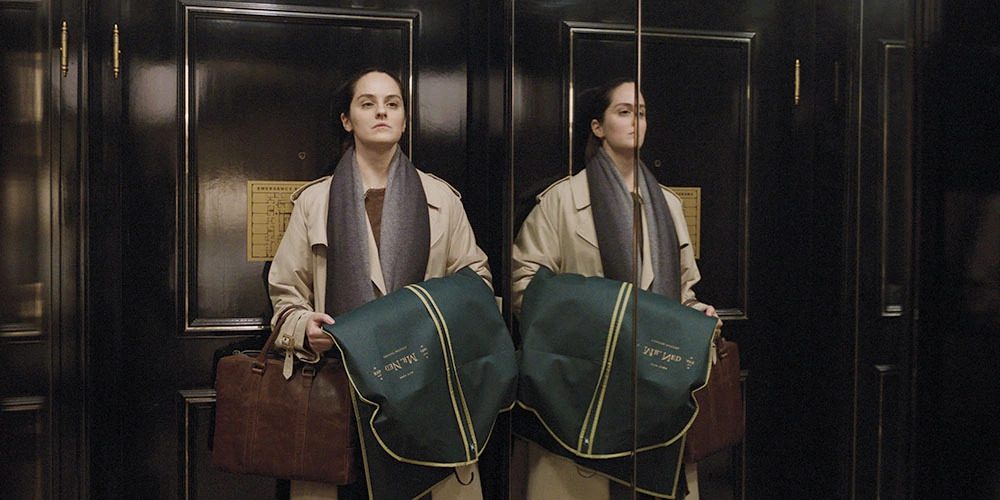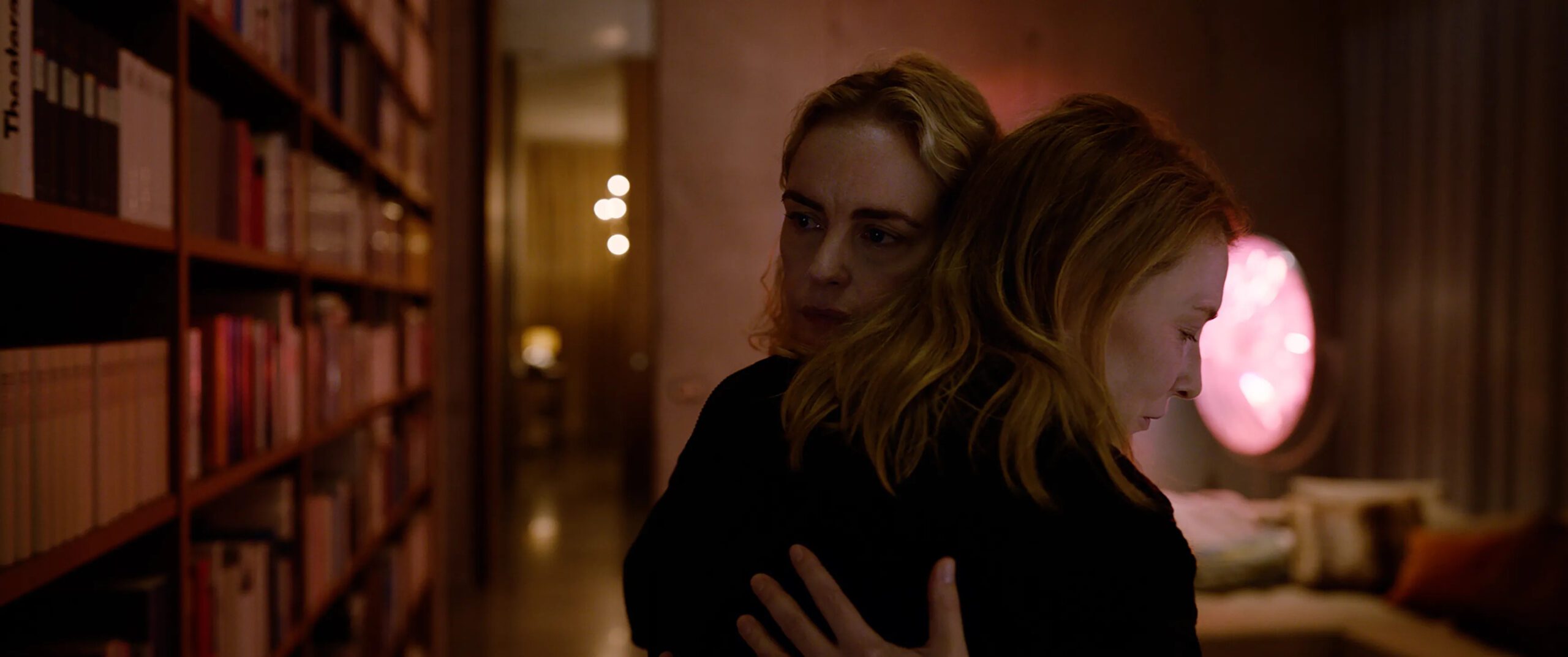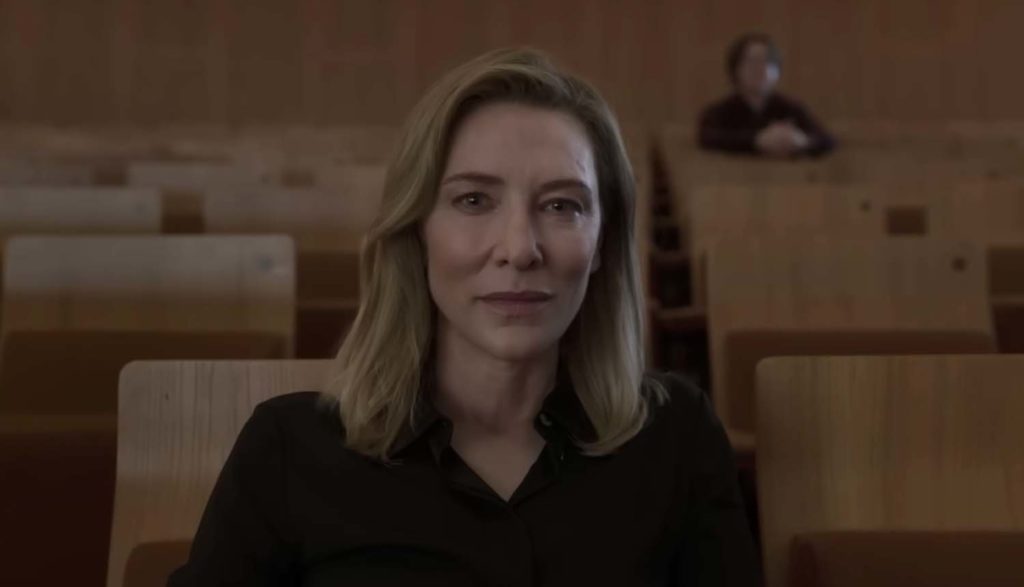REVIEW: Tár (2022)
Tár is not a film that is easily analyzed or critiqued, as it does not ebb and flow with the customary arcs and crescendos of mainstream storytelling. The beautifully chaotic and rousing orchestral soundtrack seems diametrically opposed to the slow build and gradual edification that defines the story. Instead of adhering to the patterns of the average narrative, Tár forges its own path, choosing to reflect the emotional strain of its lead with a tense yet steady momentum, culminating in an unexpected yet gratifying conclusion. Tár is a character study in the simplest of terms, depicted in countless increasingly unorthodox ways. Its flaws are few, and its beauty is apparent.
Every layer of this film is carefully cultivated and refined to the smallest detail, mirroring the precision the main character displays in constructing her interpretations of symphonies. Every actor, set designer, composer, and camera operator understood the task required of them and executed it in perfect harmony, resulting in a very rare piece of media that endeavors to gratify by merely asking a question and never delivering upon the answer. Cate Blanchett breathes life into Lydia in one of the most compelling performances of her career, lending legitimacy to the film’s already stellar cast and script. Few actresses could have brought Lydia to life so well, floating between madness, apparent emotional disinterest, and drastic musical displays. Without Cate, Tár doesn’t achieve half of the excellence that it displays.
Tár features the rise and fall of Lydia Tár, a renowned conductor known the world round. Her proudest moment fast approaching – a live recording of one of her most beloved compositions – Lydia attempts to give justice and voice to the meaning and the intent that she feels is buried beneath every note of the symphony. The music and the art are all that matter to her; nothing else exists beyond the base need she derives from this sound. Only by her excellence can she birth her interpretation to the world, leaving her cynical and disinterested in the broader world and her family. Relationships are all but a means to an end, extorted for any transactional value possible to propel her work forward. This view of her world places undue strain upon those near her, driving them away. Can the constant enslavement to the art be detrimental to the art itself? This question hides just beneath Lydia’s view in her descent into madness and potential ruin.
With the decay of the artistry of filmmaking, the daily corporate sludge exuded from Hollywood grows ever more tiring and monotonous. Yet, Tár proves that artists still exist within an industry in decline; this is evident most clearly within the film’s acting, cinematography, and writing, all of which are unexpectedly phenomenal. Compelling characterization is one of the most challenging obstacles a writer must overcome, especially without being heavy-handed or bland. Breathing life into characters requires a delicate balance of show and tell, so many minor details building the broader tapestry of a fully realized and three-dimensional character. Without exception, every prominent character in Tár is built beautifully upon subtle yet apparent choices made by both the writers and the actors. Nothing needs ever be explicit, and, as such, it never is. New details can be discovered upon a revisit. Subtlety and trusting the audience are difficult to get right in a single scene, but Tár contains these hard features in spades. So much is left up to the audience to infer within the characters and the plot, much like Lydia posits is the essential and defining aspect of compelling music: “The beauty is always in the question and never in the answering.” Tár is not a passive experience; the audience must be vigilant, absorbing small details to draw their own conclusions about every scene, moment, and character.

One of the few writing challenges that surpasses the difficulty of compelling characterization – while also informing characterization – is dialogue. Countless things must be taken into account for authentic and meaningful dialogue. Multiple meanings and intentions must exist while fitting within the speaker’s history, origin, and lifestyle. Tár perfectly captures the perceived pretentiousness of those consumed by an art form in which an everyday individual has no interest. The choice of vocabulary and sentence emphasis effortlessly morphs from character to character, reflecting who they are in several fascinating ways. Every line of dialogue offers more than is at first visible on the surface. Lines such as “A soul selects one’s own society,” “The narcissism of small differences leads to the most boring of conformity,” and “The architect of your soul is social media” give the audience beautiful glimpses into the mind of Lydia with a deeper meaning and various interpretations apparent upon closer inspection.
Many choices made by the creators behind Tár cannot be easily categorized, lending to a very unorthodox film. The film doggedly refuses to take sides in any conflict, even in favor of the protagonist. It never claims that Lydia is hero or villain, good or bad, right or wrong. It often refrains from confirming seemingly essential pieces of information, such as the truth behind sexual misconduct allegations made against Lydia, because the truth would change little about the music or the way she sees the world.
Perhaps the most defining feature of Tár is also, potentially, its most controversial. The pacing of the film does not flow with inflection, rising and falling to incite various emotions, as the audience is accustomed. Instead, the film appears to be entangled in a perpetual vibrato, imperceptibly building before fading away unexpectedly without the anticipated fulfillment. Some audience members who cannot dedicate themselves wholly to this film for one reason or another or are unfamiliar with such steady and unvaried pacing may find Tár aggravating, boring, and borderline annoying. Others more accustomed to slow-burn character studies of this caliber will more likely lean toward narrative edification due to this unorthodox pacing.

Editing and cinematography must work in harmony, complementing each other, or any intent and talent derived from either will evaporate. Conforming perfectly to the film’s pacing, the editing and cinematography beautifully complement the film’s themes, its intent, and the facilitation of emotional responses. Tár is comprised primarily of long single takes, which further display the exceptional acting of the film, requiring the actors to nail an entire scene rather than relying upon quick cuts to cover any mistakes. Every shot is chosen with specific objectives in mind, with far more occurring in each take than first meets the eye. One shot, in particular, stands out above the rest. Throughout the film, Lydia is haunted by everyday noises, which she reincorporates into the composition of her magnum opus that she hopes will define her career.
One sound, in particular, derived from the rhythmic beeping of a piece of everyday technology, births the initial notes of her piece. These two notes reappear throughout the film with such frequency that the audience can immediately recognize them. For the shot in question, a new cellist that has taken Lydia’s fancy begins to play her composition without her knowledge, beginning with those first two notes. Far in the background, beautifully framed by the light of a window and out of focus to trick the audience into centering upon the cellist rather than her, Lydia reacts to these familiar notes, suddenly stiffening and turning. Even though her face is unclear due to the distance and lack of focus, Lydia’s emotions are apparent, framed beautifully by a talented cinematographer. If it were not for this editing and cinematography, the seemingly stagnant pacing might grate upon even the most interested of viewers.

The primary conflict of Tár is an unexpected one that builds slowly throughout the film, going through the majority of it unnoticed. Several small interactions, seemingly throwaway lines, and careful emphasis construct the conflict before it comes crashing down like a ton of bricks. Due to Lydia’s desire for purely transactional relationships with all she encounters, many perceive her as someone guilty of impropriety, primarily in a sexual fashion. A former colleague with an undefined relationship appears to stalk Lydia on social media, her attempts at attention growing more erratic and dangerous. This woman feels as if she’s been used by Lydia and left broken and discarded when their transaction was completed. She begins tearing Lydia’s life down piece by piece, fueled by a social media smear campaign against Lydia brought about by her refusal to participate in cancel culture against the composers of the past. For the majority of Tár, it’s unclear that this broken former colleague would be the cause and the unwitting instigator of Lydia’s arc. The film does a wonderful job of slowly building to this revelation with so many subtle choices.
As previously mentioned, a cancel culture campaign is begun against Lydia for her refusal to participate in the smearing of Johann Sebastian Bach for his white male birth. When a diverse student expresses his distaste for Bach on the basis of his race, gender, orientation, and the number of his children, Lydia bites back with several profound lines, ending with the statement that this student should be judged by the same rules he judges the past. Does the student wish to be judged based on his race and gender while conducting a piece composed by a woman? One character even equates life in Nazi Germany and living under Soviet rule to current-day cancel culture. Many audience members have gone so far as to say that this film is anti-woke as a result of Lydia’s position on such matters. Whether or not that is the truth behind the creators’ intentions, Tár definitely appears to fit that description due to the current extreme landscape of Hollywood. However, Tár is not trying to make a statement on the subject.
Lydia is completely focused on the music, irregardless of who was responsible for that music. This hyperfocus forces her to refute claims that she is a frontrunner in the industry due to her gender and sexual orientation because she genuinely does feel like it has nothing to do with the music. By necessity of the modern world that she exists in, she was always on a collision course with current sensibilities. The wokeness or anti-wokeness of the film is perfectly integrated in a logical fashion that does not endeavor to take a stand on this issue, much like it refuses to take a stand on any issue whatsoever. It merely addresses the facts and displays how this specific character would react under modern circumstances. Tár is anti-woke in that it depicts a flawed lesbian reacting in a manner consistent with the character that the film has constructed. It does not intend to send any anti-woke message. It only intends to tell a good story with an interesting protagonist and comes across as anti-woke in comparison to modern Hollywood.

The flaws of Tár are few and far between, many falling into nitpicky territory. For example, the film’s use of text messages and the way that it shows them on-screen is incredibly distracting, unrealistic, and inconsistent. It appears that someone is just holding a phone in front of the camera while a conversation is texted back and forth without influence from the phone itself. From a writing perspective, the primary flaws come by way of clunky character exposition. The beginning of the film opens with a man listing all of Lydia’s achievements and her life story before beginning to interview her. It comes across as cheap and unnecessary, offering very little needed information that couldn’t have been inferred by the film itself. There are several other instances where character exposition is dumped upon the audience with little to no finesse. However, these moments are rare and not an overall detriment to the film. English subtitles would have also been helpful during the film’s many German sequences. Luckily, most of the German lines were either selectively chosen for their lack of importance or supported by good enough performances that the translations themselves are unnecessary.
The last criticism is a rather large one, derived from the primary conflict of the film. Lydia is accused of being a sexual predator who trades favors with young women in exchange for personal gratification. Tár refrains from confirming or denying whether or not Lydia is indeed a sexual predator, which offers interesting and unexpected avenues of narrative exploration. Tár‘s decision to depict a lesbian accused of sexual misconduct is a risky one and offers compelling exploration. That aspect of the film is fascinating and well-executed. However, the modern world immediately turning upon her with full-on riots and cancel culture campaigns seems a tad unbelievable. Without extensive evidence, it’s unlikely that a cancel culture mob would form on social media to attack a lesbian that easily and with such gusto. If the film had properly justified the mob wanting to cancel her beyond the single choppily edited video that mischaracterized her refusal to cancel Bach, the believability would have been greatly enhanced.

Tár is an unequivocal masterpiece so foreign in the current media landscape because of both its subject matter and its immensely talented execution. Few films of the past year were more emotionally gratifying or intriguing than this one. For once, the Academy Awards is perfectly justified in nominating this film for best picture, best actress, best director, best original screenplay, best cinematography, and best film editing. Tár is an easy contender for every single one of these categories and is due all the adulation it has received.
Tár (2022)
Plot - 7
Acting - 9.5
Direction/Editing - 9
Music/Sound - 9
Characters - 9
8.7
Great
Tár is an unequivocal masterpiece so foreign in the current media landscape because of both its subject matter and its immensely talented execution.







